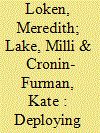| Srl | Item |
| 1 |
ID:
163272


|
|
|
|
|
| Summary/Abstract |
Why do governments and militaries publicly condemn and prosecute particular forms of abuse? This article explores the Sri Lankan government's decision to promote limited legal accountability for state-perpetrated rape committed in a country otherwise renowned for widespread impunity. We argue that rather than representing a turn against impunity, the symbolic stance against conflict-related sexual violence in a small number of high-profile cases served an explicitly politico-military agenda. The state deployed legal accountability in specific cases to garner political legitimacy among key domestic audiences. The Sri Lankan government drew on the symbolism of female victimhood to mobilize support at a time when support for military counterinsurgency was waning. We show that governments can uniquely instrumentalize sexual violence cases to establish moral authority and territorial legitimacy. Through an examination of the domestic legal response to state-perpetrated human rights abuses, we illustrate the many ways in which women's bodies—and the law—can be mobilized in war to serve military ends.
|
|
|
|
|
|
|
|
|
|
|
|
|
|
|
|
| 2 |
ID:
160324


|
|
|
|
|
| Summary/Abstract |
The diversity of political spaces, availability of cheap labor, ease of access to powerful figures, and safety net of a foreign passport attract researchers to the developing world. However, environments of extreme state weakness and ongoing conflict permit research behavior that would be frowned on in the global north. We suggest that weak regulatory authority in conflict-affected states offers foreign academics opportunities that are not available when states have greater reach or capacity. Qualitative researchers may find requests to interview victims or perpetrators of wartime violence granted with ease. Experimenters can coerce under-resourced NGOs to pursue interventions at odds with their organizational mandates. We posit that conflict contexts can constitute permissive environments in which researchers can engage in conduct that would be considered deeply problematic at home. Because studying political violence can require firsthand research on aspects of political life not easily observed elsewhere, this article offers a set of guidelines to foster more ethical and responsible research practices.
|
|
|
|
|
|
|
|
|
|
|
|
|
|
|
|
| 3 |
ID:
171448


|
|
|
|
|
| Summary/Abstract |
Why do repressive states create human rights institutions that cost them money and political capital but fail to silence international criticism? The academic literature assumes that states engaging in disingenuous human rights behavior are hoping to persuade (or deceive) liberal Western states and international advocates. But if human rights promoters in the West are the target audience for the creation of these half measures institutions, the strategy appears puzzlingly miscalculated. It reveals that the repressive state is sensitive to international opinion, and often results in increased pressure. The author argues that states engaging in human rights half measures are playing to a different, previously overlooked audience: swing states that can act as veto points on multilateral efforts to enforce human rights. The article illustrates these dynamics with a case study of Sri Lanka’s response to international pressure for postwar justice. The author shows that although the creation of a series of weak investigative commissions was prompted by pressure from Western governments and ngos, it was not an attempt to satisfy or hoodwink these actors. Instead, it was part of a coalition-blocking strategy to convince fellow developing states on the UN Human Rights Council to oppose the creation of an international inquiry and to give them the political cover to do so.
|
|
|
|
|
|
|
|
|
|
|
|
|
|
|
|